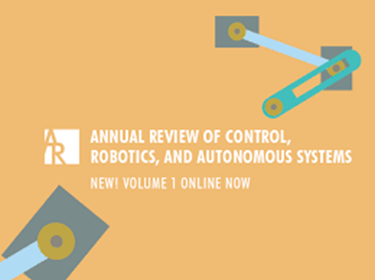从虚拟现实到新兴的感知工程学科
IF 14
1区 计算机科学
Q1 AUTOMATION & CONTROL SYSTEMS
Annual Review of Control Robotics and Autonomous Systems
Pub Date : 2023-11-06
DOI:10.1146/annurev-control-062323-102456
引用次数: 0
摘要
这篇文章说明了一个强大的新学科,我们称之为感知工程,正在稳步崛起。从历史绘画和电影到现代电子游戏和虚拟现实,它遵循了一系列涉及创造幻觉的想法。感知工程师创造的不是像桥梁、飞机或计算机这样的实体人工制品,而是虚幻的感知体验。范围定义为与物理世界相互作用的任何代理,包括生物有机体(人类和动物)和工程系统(机器人和自主系统)。关键思想是,一个被称为生产者的主体,改变环境的目的是改变另一个被称为接受者的主体的感知体验。最重要的是,本文基于冯·诺伊曼-摩根斯坦的信息概念,引入了这一过程的精确数学公式,以帮助界定和定义这一学科。然后将此公式应用于工程和生物制剂的案例,并讨论其对虚拟现实,机器人甚至社交媒体等现有领域的影响。最后,确定了公开的挑战和参与的机会。预计《控制、机器人和自主系统年度评论》第七卷的最终在线出版日期是2024年5月。修订后的估计数请参阅http://www.annualreviews.org/page/journal/pubdates。本文章由计算机程序翻译,如有差异,请以英文原文为准。
From Virtual Reality to the Emerging Discipline of Perception Engineering
This article makes the case that a powerful new discipline, which we term perception engineering, is steadily emerging. It follows from a progression of ideas that involve creating illusions, from historical paintings and film to modern video games and virtual reality. Rather than creating physical artifacts such as bridges, airplanes, or computers, perception engineers create illusory perceptual experiences. The scope is defined over any agent that interacts with the physical world, including both biological organisms (humans and animals) and engineered systems (robots and autonomous systems). The key idea is that an agent, called a producer, alters the environment with the intent to alter the perceptual experience of another agent, called a receiver. Most importantly, the article introduces a precise mathematical formulation of this process, based on the von Neumann–Morgenstern notion of information, to help scope and define the discipline. This formulation is then applied to the cases of engineered and biological agents, with discussion of its implications for existing fields such as virtual reality, robotics, and even social media. Finally, open challenges and opportunities for involvement are identified. Expected final online publication date for the Annual Review of Control, Robotics, and Autonomous Systems, Volume 7 is May 2024. Please see http://www.annualreviews.org/page/journal/pubdates for revised estimates.
求助全文
通过发布文献求助,成功后即可免费获取论文全文。
去求助
来源期刊
CiteScore
28.30
自引率
2.20%
发文量
25
期刊介绍:
The Annual Review of Control, Robotics, and Autonomous Systems offers comprehensive reviews on theoretical and applied developments influencing autonomous and semiautonomous systems engineering. Major areas covered include control, robotics, mechanics, optimization, communication, information theory, machine learning, computing, and signal processing. The journal extends its reach beyond engineering to intersect with fields like biology, neuroscience, and human behavioral sciences. The current volume has transitioned to open access through the Subscribe to Open program, with all articles published under a CC BY license.

 求助内容:
求助内容: 应助结果提醒方式:
应助结果提醒方式:


